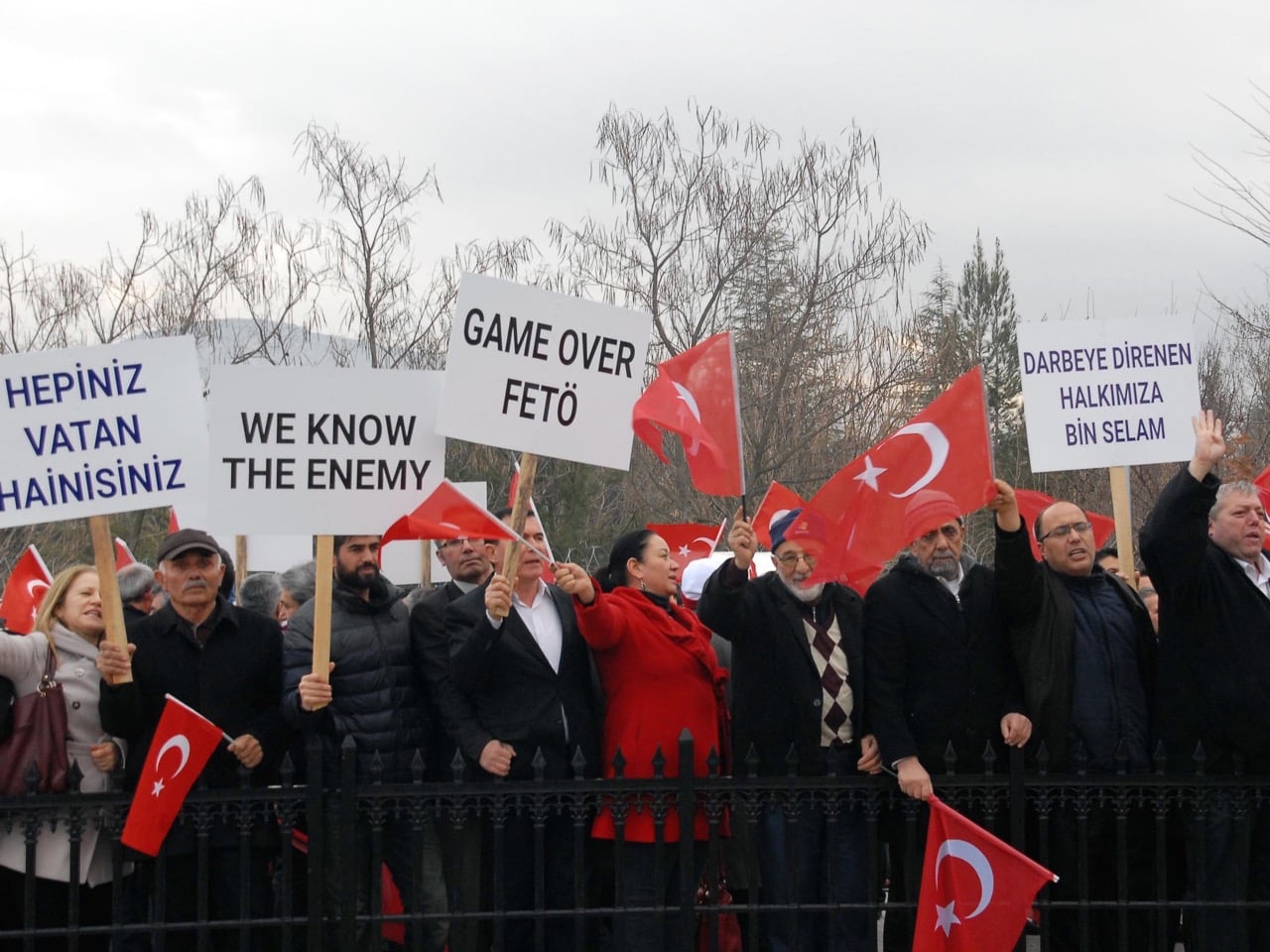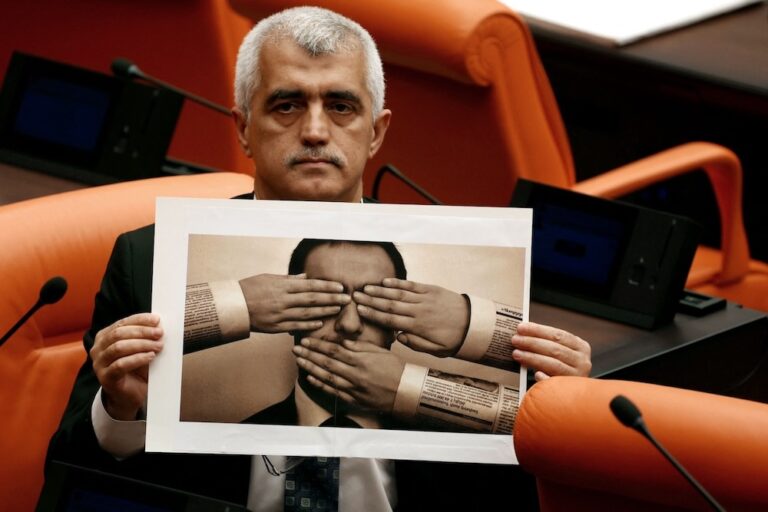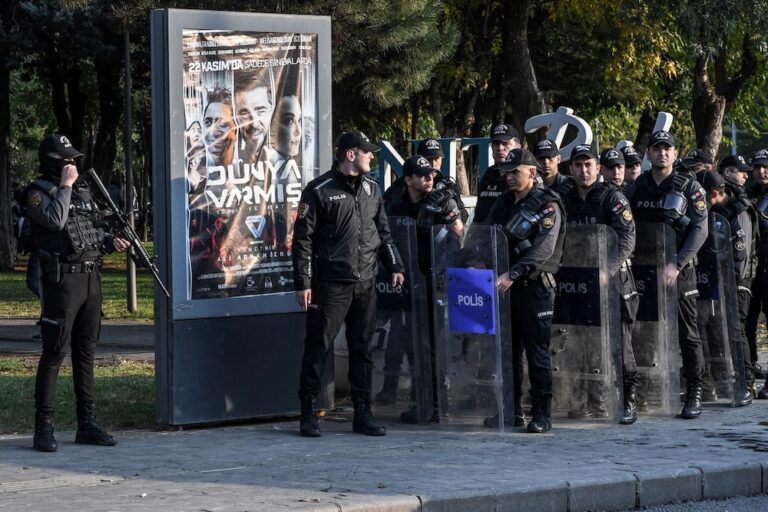There is deep concern over the visibly political nature of the current trials and the blatant abuse of the Penal Code and Anti-Terror law against journalists and human rights defenders.
This statement was originally published on article19.org on 20 February 2017.
Last week, ARTICLE 19, PEN International and Reporters without Borders (RSF) monitored the hearings of several criminal cases against journalists and human rights defenders in Turkey, all of whom face politically-motivated charges of propaganda for, or involvement in, terrorist organisations.
We are deeply concerned by the visibly political nature of these trials and the blatant abuse of the Penal Code and Anti-Terror law against journalists and human rights defenders. To date, no convincing evidence of the accused journalists’ involvement in terrorism or incitement to violence has been publicly presented. The cases also raised serious concerns in terms of due process and the right to a fair trial.
ARTICLE 19, PEN International and RSF call on the Turkish government to take immediate steps to restore the independence of the judiciary, reform laws which contradict international human rights standards, ensure due process during trials and cease the judicial harassment of journalists and human rights defenders.
The trials
Representatives from the three organisations attended the following trials on 14 – 15 February 2017:
Özgür Gündem Solidarity Case: On Tuesday 14 February, participants monitored a hearing of 22 of the journalists, writers and human rights defenders who participated in a solidarity action with the daily newspaper Özgür Gündem, which was forced to cease publication in August 2016. During the hearing, writer and journalist Cengiz Baysoy, peace activist İmam Canpolat and a leader of the opposition, pro-Kurdish People’s Democratic Party (HDP) Çilem Küçükkeleş, were found guilty of “spreading propaganda for the Kurdistan Workers’ Party (PKK)” and “releasing statements sent by PKK”, in relation to the articles published on the day they acted as symbolic editor. All three were sentenced to one year and three months in prison and a fine of 6,000 Turkish Liras (approx. 1,500 Euro).
On 14 February, RSF also attended a hearing in a separate case against Hasan Cemal, veteran author and columnist, former editor-in-chief and now commentator for news portal T24. The author received a suspended sentence of one year and three months in prison under Article 7 (2) of the Anti-Terror Law (“making propaganda for a terrorist organisation”) in relation to an article referring to a previous interview with a PKK leader.
OdaTV Case: On Wednesday 15 February ten prominent journalists, including Ahmet Şık, Nedim Şener, Soner Yalçın, Barış Pehlivan and Barış Terkoğlu, made their final defense statements in the OdaTV trial. The case has been ongoing since 2011. The defendants are accused of being the media arm of a secret terrorist organisation, known as “Ergenekon”; however, at the previous hearing on 14 December 2016, the prosecutor requested the acquittal of all twelve defendants due to insufficient evidence of the existence of the “Ergenekon” organisation. A verdict is expected on 12 April 2017.
Taraf Case: Also on 15 February, the organisations monitored the third hearing in the trial of journalists and editors affiliated with the Taraf newspaper: Ahmet Altan, Mehmet Baransu, Yasemin Çongar, Yıldıray Oğur and Tuncay Opçin. They are all charged with acquiring and divulging state secrets in relation to the Egemen military plan, an out of date military war plan to respond to a Greek invasion. Baransu and Opçin face additional charges of membership and administration of the Fethullah Gülen Terrorist Organisation (FETÖ). The hearing was cut short as Baransu, who has been in pre-trial detention for over two years and was due to present his defence, was unable to attend as he had a hearing in a separate case in Mersin.
Inconsistent, politically-motivated charges
The indictments and charges include multiple inconsistences, suggesting the influence of politics on the justice system.
For example, investigative journalist Ahmet Şık, whose hearing in the OdaTV Case was observed this week, is in the unusual position of being tried simultaneously in two separate and contradictory cases, one in which he is accused of “supporting the Ergenekon organization” on the basis of his book in 2011 criticising the Gülen movement, and another for “supporting the FETÖ and the PKK”.
The Taraf case is also marred by inconsistencies and confusion, with an indictment that was largely copy-pasted from last year’s case against Can Dündar, with his name still featuring in the text.
The series of cases relating to those involved in the Özgür Gündem Solidarity Campaign constitute a politically motivated abuse of the Anti-Terror law against Kurdish journalists and civil society activists defending them. The charges against the defendants rely solely on their association with the newspaper, either as members of the advisory board or through columns written in the paper.
Due process and the right to a fair trial
We are concerned by multiple abuses in the defendants’ right to a fair trial, and failures to observe due process.
Many of the defendants face numerous cases, with several being held in pre-trial detention, despite no clear rationale offered for this, with no indication that they will receive a fair trial within a reasonable period. This includes Mehmet Baransu, detained since 2 March 2015; Ahmet Altan, detained since 10 September 2016; and Ahmet Şık, detained since 29 December 2016. The Turkish authorities’ use of indefinite periods of pre-trial detention against journalists is in violation of international standards on the right to liberty and the right to a fair trial.
Moreover, in the Taraf case, the right to a fair trial is severely compromised by the conditions of Baransu’s now almost two-year pre-trial detention, where he has insufficient access to his lawyer and the case documents, meaning that he has so far been unable to prepare his defence.
While we welcome the request of the Prosecutor in the OdaTV Case to acquit the defendants, we are nevertheless concerned that this will not enable the genuine restoration of justice for the defendants, many of whom were held in pre-trial detention, some for more than a year, during the course of the investigation. A thorough review into the criminal investigation and subsequent trials is required to ensure those responsible for the miscarriage of justice are held accountable. Urgent steps must be taken to ensure the independence of the police and judiciary to prevent the same miscarriage of justice in other cases, including with regard to the ongoing cases against journalists.
Independence of the Judiciary, national security and the right to freedom of expression
The independence of the judiciary is protected under Article 138 of the Turkish constitution, however in practice political interference in the justice system is undeniable. As noted by Nils Muiznieks, Council of Europe Commissioner for Human Rights, in his statement on 15 February 2017, elements of the judiciary have become “an instrument of judicial harassment to stifle opposition and legitimate criticism”.
Moreover, as stated in our joint report issued in September 2016, the judiciary have numerous legal provisions at their disposition, which are ostensibly aimed at ensuring national security but may be used to stifle free expression. This includes overly vague provisions in the Penal Code that prohibit “propaganda” or “praising” of a terrorist organisation, as well as clauses that allow for individuals to be accused of “aiding and abetting a terrorist organisation”, purely on the grounds of an act of expression about that terrorist group. This is in clear violation of international standards on freedom of expression.
In its official response to the Council of Europe, Turkey claims that those on trial are not journalists, but terrorists: that they are not charged on the basis of their journalism. To date, we are not aware of any evidence of involvement in terrorism being presented against any journalist. The evidence used against journalists appears to consist entirely of the content of their articles or news they edited.
Turkey further claimed that it “has compromised neither its efforts to strike the right balance between freedom and security nor its ultimate determination to maintain reform agenda”; and that the provisions in the penal code and Anti-Terror law fall within international standards.
We contest that Turkey has indeed failed to strike the right balance, both in law and in practice. The Johannesburg Principles on National Security and Freedom of Expression set out the appropriate balance under international law: for a restriction on freedom of expression in the name of national security to be legitimate, there must be an intentional, direct and immediate connection between the expression and the likelihood of violence. The articles in the Penal Code and the Anti-Terror law fail comprehensively to meet these requirements, with broad and undefined terms enabling the government to use them as a weapon to silence critical voices.
Recommendations to the Turkish authorities
- Immediately and unconditionally release all journalists, media workers and others arrested for exercising their right to freedom of expression, without any individualised evidence of involvement in a crime;
- Cease the judicial harassment of journalists and human rights defenders;
- Ensure the Ministry of the Interior and the Ministry of Justice initiate a thorough and transparent investigation into failures in previous criminal investigations and past abuses of the criminal justice system, exemplified by the OdaTV case, with sufficient safeguards to avoid further politicisation;
- Take immediate steps to restore the independence of the judiciary, including by working with international partners such as the Council of Europe and the Organisation for Security and Cooperation (OSCE) in Europe. As a first step, ensure that defendants have the right to swift judicial review of decisions, including on pre-trial detention, and increase transparency of judicial decisions, by accepting the standing offer of the OSCE Office for Democratic Institutions and Human Rights to send trial monitors, and cooperating fully with the Office on this initiative. Lift the state of emergency and reverse the measures implemented during the state of emergency which infringe the right to freedom of expression;
- Reform the Anti-terror law and the criminal code, in line with international standards on the right to freedom of expression.



